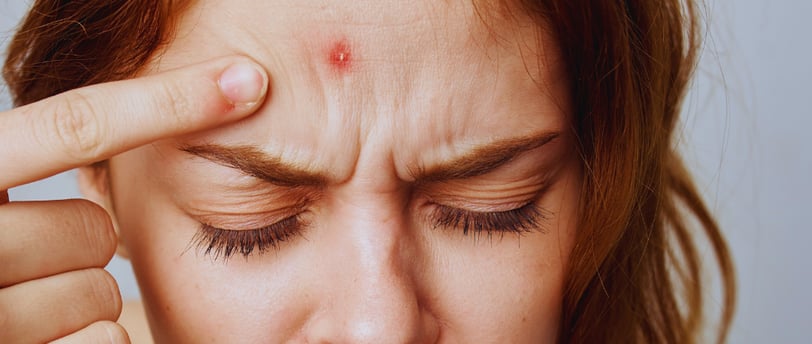How to Stop Pimples from Coming on Your Face: A Complete Guide
Tired of dealing with breakouts? This blog shares simple, effective tips to prevent pimples and keep your skin clear. Learn how to cleanse, exfoliate, hydrate, and manage your diet to stop pimples from forming. With natural remedies, skincare advice, and easy lifestyle changes, you can achieve healthier, glowing skin. Say goodbye to breakouts and hello to confidence! 🌸✨
SKINCARE
12/6/20243 min read


Pimples are a common skin concern, but with the right care and habits, you can prevent them from popping up. This blog will guide you through effective tips and practices to keep your skin clear and pimple-free. From skincare routines to dietary changes, here’s everything you need to know to take control of your skin!
Why Do Pimples Occur?
Pimples happen when your skin’s pores get clogged with oil, dead skin cells, and bacteria. Here are some common causes:
Excess oil production (especially in oily skin types).
Hormonal changes (during puberty, menstruation, or stress).
Poor hygiene or clogged pores from makeup, dirt, and sweat.
Unhealthy diet rich in sugary or greasy foods.
Stress that triggers hormonal imbalances.
Understanding the root cause of your pimples can help you choose the right prevention strategies.
Step-by-Step Tips to Stop Pimples
1. Cleanse Your Face Properly
Washing your face is the first step in preventing pimples.
Use a gentle cleanser to remove dirt, oil, and makeup without irritating your skin.
Wash your face twice daily—once in the morning and once before bed.
Avoid using harsh soaps or scrubbing too hard, as this can irritate your skin.
2. Exfoliate Regularly
Exfoliation helps remove dead skin cells that can clog pores.
Use a gentle exfoliant with salicylic acid or natural ingredients like oatmeal.
Exfoliate 1-2 times a week to avoid over-scrubbing.
Avoid physical scrubs with large, rough particles that can damage your skin.
3. Keep Your Skin Hydrated
Hydration is key to healthy skin, even if you have oily skin.
Use a lightweight, non-comedogenic moisturizer to prevent your skin from drying out.
Look for ingredients like hyaluronic acid or aloe vera for hydration without clogging pores.
4. Avoid Touching Your Face
Your hands carry dirt and bacteria, which can transfer to your skin.
Avoid touching or picking at your pimples, as this can lead to infections and scars.
Keep your hands clean and sanitize your phone regularly to reduce contact with bacteria.
5. Follow a Balanced Diet
What you eat affects your skin.
Avoid excessive sugary and greasy foods, as they can trigger pimples.
Eat a diet rich in fruits, vegetables, whole grains, and lean protein.
Include foods high in zinc (like nuts and seeds) and omega-3 fatty acids (like fish and walnuts).
6. Stay Hydrated
Drinking water helps flush out toxins and keeps your skin healthy.
Aim for at least 8 glasses of water daily.
Include hydrating foods like cucumbers, watermelon, and oranges in your diet.
7. Manage Stress
Stress can cause hormonal imbalances that lead to pimples.
Practice stress-reducing activities like yoga, meditation, or journaling.
Get enough sleep—aim for 7-9 hours per night to help your body and skin recover.
8. Keep Your Environment Clean
Your surroundings can impact your skin health.
Change your pillowcases weekly to reduce oil and bacteria buildup.
Keep your hair clean and away from your face to avoid transferring oils.
Clean your makeup brushes and sponges regularly.
9. Use Acne-Fighting Products
Incorporate products that target pimples into your skincare routine.
Salicylic Acid: Unclogs pores and reduces inflammation.
Benzoyl Peroxide: Kills acne-causing bacteria and reduces redness.
Tea Tree Oil: A natural antibacterial that can help clear pimples.
Start with small amounts to avoid drying out your skin and follow up with a moisturizer.
10. Protect Your Skin from the Sun
Sun exposure can worsen pimples and cause dark spots.
Use a broad-spectrum sunscreen with SPF 30 or higher every day.
opt for oil-free and non-comedogenic sunscreens to prevent clogging pores.
Homemade Remedies to Prevent Pimples
1. Honey and Cinnamon Mask
Mix 1 tablespoon of honey with 1/2 teaspoon of cinnamon.
Apply to your face and leave it on for 10-15 minutes.
Rinse with warm water.
Honey has antibacterial properties, and cinnamon helps reduce inflammation.
2. Green Tea Toner
Brew a cup of green tea, let it cool, and use it as a toner.
Apply with a cotton pad or spray bottle.
Green tea is rich in antioxidants and reduces oil production.
3. Aloe Vera Gel
Apply pure aloe vera gel to your face before bed.
Leave it on overnight and rinse in the morning.
Aloe vera soothes inflammation and promotes healing.
When to See a Dermatologist
If pimples persist despite your efforts, consider consulting a dermatologist. They may recommend:
Prescription-strength topical treatments like retinoids or antibiotics.
Oral medications for severe acne, such as isotretinoin or hormonal therapy.
Professional treatments like chemical peels or laser therapy.
Conclusion
Preventing pimples is all about consistency and care. By following a proper skincare routine, maintaining a healthy diet, and managing stress, you can keep your skin clear and pimple-free. Remember to be patient and give your skin time to heal.
Frequently asked questions
1. Can stress alone cause pimples?
Yes, stress can trigger hormonal changes that increase oil production, leading to pimples.
2. How long does it take to see results with these tips?
It can take 2-4 weeks to see noticeable improvements, depending on your skin type and the severity of your pimples.
3. Are natural remedies safe for all skin types?
Most are safe, but always do a patch test to check for allergies or irritation before applying to your face.
Explore
Discover tips for skincare, bodycare, and haircare.
Contact-
© 2024. All rights reserved.
